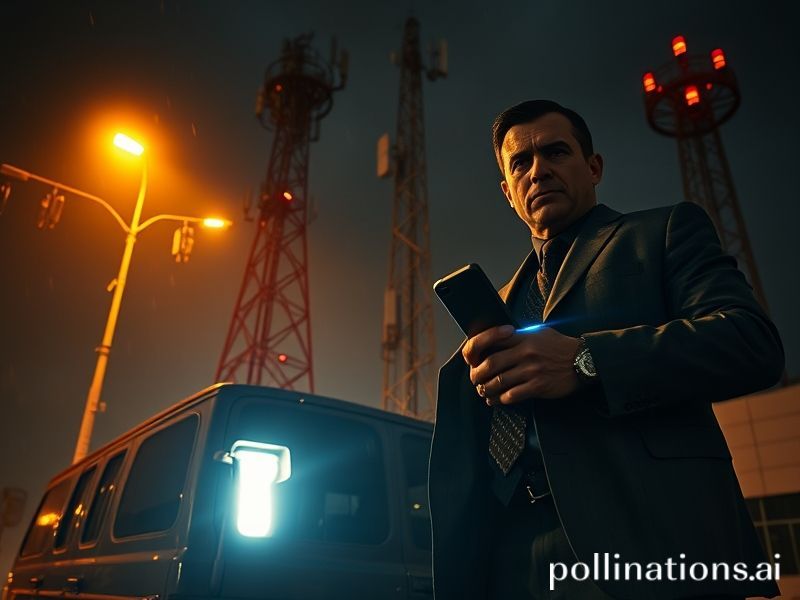Every President’s Walkie-Talkie Is Leaking: A Global Tour of Security Theater
The Last Line That Wasn’t Encrypted
International dispatch from the Department of Schadenfreude
By the time you finish this sentence, three presidential bodyguards in three different time zones will have whispered the same six-digit code into the same brand of Chinese-manufactured earpiece. The code is supposed to change every 12 hours. It doesn’t. Somewhere between Geneva and Jakarta, a hobbyist with a software-defined radio and a serious grudge against Tuesdays is listening in, sipping an oat-milk latte and wondering why grown men still say “Eagle has landed” when the flight tracker app already told him the Gulfstream touched down nine minutes ago.
Welcome to the age of the Secret Service Telecommunications Threat, a phrase that sounds like it was focus-grouped by people who also named “Freedom Fries.” The shorthand: the people who protect the people who can launch the nukes are still using tech that struggles against a moderately motivated teenager with a Flipper Zero. Last month, security researchers at the Chaos Communication Camp in Hamburg (think Burning Man with more sweat and better op-sec) demonstrated how to hijack the TETRA radio standard that guards half of Europe’s heads of state. The exploit—cheekily nicknamed “TETRApwn”—was patched in 2022, but patches require budgets, and budgets require politicians who can spell “cryptographic agility” without checking TikTok.
Meanwhile, south of the equator, Brazil’s newly re-minted president discovered his motorcade’s comms were leaking like a Carnival caipirinha after a TikTok influencer live-streamed the frequency while chasing the convoy on a scooter. The hashtag #Bolsosniff quickly trended, because of course it did. The incident might have been funny—if the same leak hadn’t synced perfectly with the route of a visiting dignitary whose security detail believed “end-to-end encryption” was a brand of Swiss chocolate.
Across the Pacific, Japan’s National Police Agency upgraded to a flashy 5G mesh network, then accidentally left the management interface on factory defaults. A bored university student in Osaka found it between rounds of Elden Ring, politely informed the government, and was thanked with a ¥10,000 gift card—roughly the price of two decent sushi dinners, or one bullet-train ticket to contemplate the absurdity of national defense. The student later posted the saga on Reddit under the handle “Seppukudriver,” because nothing says cultural diplomacy like ritual disembowelment memes.
The broader significance? We have built a planetary panopticon of surveillance cameras, biometric gates, and AI lie detectors, yet the guys with the actual nuclear football still rely on walkie-talkies that can be defeated by a prank app called “Radio Karen.” International arms-control treaties meticulously count warheads but ignore the fact that the launch order could plausibly be spoofed by a TikTok dance challenge. The Five Eyes alliance shares everything except a single, unified radio standard—partly because everyone wants their own domestic contractor to get the kickbacks, and partly because admitting the emperor has no encryption would require acknowledging that the empire runs on Excel spreadsheets and hope.
There is, naturally, a cottage industry of contractors promising quantum-resistant, AI-hardened, blockchain-blessed comms gear. Their brochures feature stock photos of grim-faced agents in wraparound shades staring at holographic maps. The price tag is roughly the GDP of Slovenia. Delivery date: 2035, pending export controls, budget overruns, and the eventual realization that the real threat isn’t the tech but the middle manager who clicks “Remind Me Tomorrow” on the security update.
In the end, every breach is a morality play with Bluetooth. We want to believe there is a red phone under glass, manned by steely-eyed professionals who speak in clipped, heroic sentences. Instead, there is a WhatsApp group called “POTUS Ride Coordination” where someone occasionally forwards a meme of a cat wearing sunglasses labeled “CLASSIFIED.” The cat is out of the bag, wearing AirPods, and live-tweeting the motorcade route.
Conclusion: The planet’s most sensitive conversations are only as secure as the weakest intern who thinks “123456” is a strong password because it has six characters and no dictionary words. Until that intern is replaced by a robot that updates itself before breakfast—and until governments decide that “cyber” is not just a prefix for budget requests—the Secret Service Telecommunications Threat will remain what it has always been: an open secret, broadcast in the clear for anyone listening with the right frequency and just enough cynicism to expect nothing better from the species.







